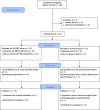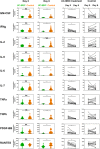Umbilical cord mesenchymal stem cells for COVID-19 acute respiratory distress syndrome: A double-blind, phase 1/2a, randomized controlled trial
- PMID: 33400390
- PMCID: PMC8046040
- DOI: 10.1002/sctm.20-0472
Umbilical cord mesenchymal stem cells for COVID-19 acute respiratory distress syndrome: A double-blind, phase 1/2a, randomized controlled trial
Abstract
Acute respiratory distress syndrome (ARDS) in COVID-19 is associated with high mortality. Mesenchymal stem cells are known to exert immunomodulatory and anti-inflammatory effects and could yield beneficial effects in COVID-19 ARDS. The objective of this study was to determine safety and explore efficacy of umbilical cord mesenchymal stem cell (UC-MSC) infusions in subjects with COVID-19 ARDS. A double-blind, phase 1/2a, randomized, controlled trial was performed. Randomization and stratification by ARDS severity was used to foster balance among groups. All subjects were analyzed under intention to treat design. Twenty-four subjects were randomized 1:1 to either UC-MSC treatment (n = 12) or the control group (n = 12). Subjects in the UC-MSC treatment group received two intravenous infusions (at day 0 and 3) of 100 ± 20 × 106 UC-MSCs; controls received two infusions of vehicle solution. Both groups received best standard of care. Primary endpoint was safety (adverse events [AEs]) within 6 hours; cardiac arrest or death within 24 hours postinfusion). Secondary endpoints included patient survival at 31 days after the first infusion and time to recovery. No difference was observed between groups in infusion-associated AEs. No serious adverse events (SAEs) were observed related to UC-MSC infusions. UC-MSC infusions in COVID-19 ARDS were found to be safe. Inflammatory cytokines were significantly decreased in UC-MSC-treated subjects at day 6. Treatment was associated with significantly improved patient survival (91% vs 42%, P = .015), SAE-free survival (P = .008), and time to recovery (P = .03). UC-MSC infusions are safe and could be beneficial in treating subjects with COVID-19 ARDS.
Keywords: cell transplantation; cellular therapy; clinical trials; mesenchymal stem cells; respiratory tract; transplantation; umbilical cord.
© 2021 The Authors. STEM CELLS TRANSLATIONAL MEDICINE published by Wiley Periodicals LLC on behalf of AlphaMed Press.
Conflict of interest statement
The authors declared no potential conflicts of interest.
Figures



References
-
- Centers for Disease Control and Prevention . Interim Clinical Guidance for Management of Patients with Confirmed Coronavirus Disease (COVID‐19). https://www.cdc.gov/coronavirus/2019-ncov/hcp/clinical-guidance-manageme.... Updated June 20, 2020. Accessed on November 23, 2020.
-
- Berlin DA, Gulick RM, Martinez FJ. Severe Covid‐19. N Engl J Med. 2020;383:2451‐2460. - PubMed
Publication types
MeSH terms
Substances
Grants and funding
LinkOut - more resources
Full Text Sources
Other Literature Sources
Medical

